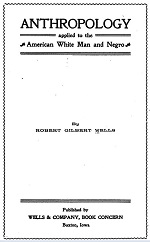Novel
Anthropology Applied to the American White Man and Negro
- by Robert Gilbert Wells
- (Wells, Book Concern, April 1905)
I met the amiable and widely read John Clute in New Hampshire in the summer of 2014. He introduced me to this work, which he describes in the Encyclopedia of Science Fiction as a satire of race relations in post-Reconstruction America. For the most part, the story takes place as a conversation between a black man, Sam Brown, and his white brother, Boss Jones. As such, it’s a subtle satire, using the “science of Anthropology” to warn us of the laziness of the Negro, the greed of the white man, and the evils of incompatible matings, among other things.
Clute classifies the work as having numerous fantastic elements such as when Sam and the author Bob Wells leave their bodies to invisibly view other happenings, at least one small bit of time travel, and the one item that’s of most interest: a potion that changes Mr. Jones into a Negro for the span of a train journey.
Whatever time travel does exist, such as a possible visit by Mr. Jones to 16th century Greece, is subtle compared to the other aspects of the satire. —Michael Main
Clute classifies the work as having numerous fantastic elements such as when Sam and the author Bob Wells leave their bodies to invisibly view other happenings, at least one small bit of time travel, and the one item that’s of most interest: a potion that changes Mr. Jones into a Negro for the span of a train journey.
Whatever time travel does exist, such as a possible visit by Mr. Jones to 16th century Greece, is subtle compared to the other aspects of the satire. —Michael Main
The doors and windows were opened, Sam and Mr. Jones walked out of the room, then to the depot purchased tickets and started for Chicago, but when the two men arrived at the depot, to Mr. Jones surprise, the ticket agent told him to get out of that waiting room or he would take a club to his head, and that pretty quick.

